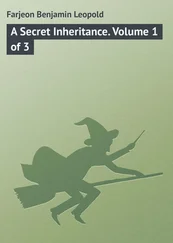Benjamin Farjeon - Joshua Marvel
Здесь есть возможность читать онлайн «Benjamin Farjeon - Joshua Marvel» — ознакомительный отрывок электронной книги совершенно бесплатно, а после прочтения отрывка купить полную версию. В некоторых случаях можно слушать аудио, скачать через торрент в формате fb2 и присутствует краткое содержание. Жанр: foreign_prose, на английском языке. Описание произведения, (предисловие) а так же отзывы посетителей доступны на портале библиотеки ЛибКат.
- Название:Joshua Marvel
- Автор:
- Жанр:
- Год:неизвестен
- ISBN:нет данных
- Рейтинг книги:3 / 5. Голосов: 1
-
Избранное:Добавить в избранное
- Отзывы:
-
Ваша оценка:
- 60
- 1
- 2
- 3
- 4
- 5
Joshua Marvel: краткое содержание, описание и аннотация
Предлагаем к чтению аннотацию, описание, краткое содержание или предисловие (зависит от того, что написал сам автор книги «Joshua Marvel»). Если вы не нашли необходимую информацию о книге — напишите в комментариях, мы постараемся отыскать её.
Joshua Marvel — читать онлайн ознакомительный отрывок
Ниже представлен текст книги, разбитый по страницам. Система сохранения места последней прочитанной страницы, позволяет с удобством читать онлайн бесплатно книгу «Joshua Marvel», без необходимости каждый раз заново искать на чём Вы остановились. Поставьте закладку, и сможете в любой момент перейти на страницу, на которой закончили чтение.
Интервал:
Закладка:
"I don't think that would do," said Dan, echoing Joshua's laugh.
"Here's another," said Joshua, and he played a prelude to "Poor Tom Bowling," and sang the first verse, -
'Here a sheer hulk lies poor Tom Bowling,
The darling of our crew;
No more he'll hear the tempest howling,
For death has broached him too.
His form was of the manliest beauty,
His heart was kind and soft,
Faithful below Tom did his duty,
But now he's gone aloft,
But now he's gone aloft.'"
Joshua sang the words with much tender feeling, but Dan shook his head.
"The birds would never be able to get the spirit of the song into them," he said, "and the tune is nothing without that. Never mind-we'll teach them something, and then the Old Sailor shall have them."
"And I shall tell him they are a present from you alone."
"No," said Dan energetically; "that would spoil it all. They are from you and me together. Can't you guess the reason why?"
"I believe I can," replied Joshua, after a little consideration. "The Old Sailor likes me, and you want him to like you because of me, not because of yourself alone; you want him to like me more because of you-as I am sure he will when he knows you."
"That's it. I want him to know that we love each other, and that we shall always love each other, whether we are together or separated. I want everybody who likes you, Jo, to like me."
Joshua laid his hand upon Dan's, which rested on the table, and Dan placed his other hand upon Joshua's playfully. Their hands were growing to be very unlike. Dan's hand, as it grew, became more delicate, while Joshua's grew stronger and more muscular. Dan laughed another pleasant laugh as he remarked the difference between them. "That is a proper kind of hand for a hero," he said. And then, in a more serious voice, "Joshua, do you know I think we can see each other's thoughts." And so, indeed, it appeared as if they could.
The next day the bullfinches were bought, and Dan began to train them. They were a pair of very young birds, not a dozen days old, and the air Dan fixed upon to teach them first was "Rule, Britannia."
So much for Joshua's supplemental contributions to the general fund. Now for Dan's.
"Another sixpence in a piece of paper, Jo!"
"That makes eighteen pence this month, Dan. Poor Susan!"
"Poor Susan!" echoed Dan.
Susan was very much to be pitied. Looking upon herself as her brother's destroyer, she endeavored, by offerings of sixpences as often as she could afford them, to atone for the crime-for so she now regarded it-by which she had made him a helpless cripple. These sixpences were not given openly; they were laid, as it were, upon the sacrificial altar in secret. Sometimes the altar was one of Ellen's shoes, and Ellen, when she dressed herself, would feel something sticking in her heel, and discover it to be a sixpence tightly screwed up in a piece of paper, with the words, "For Dan; from Susan," written on it; sometimes the altar was one of Dan's pocket-handkerchiefs, and the sixpence was tied up in a knot; sometimes it was a bag of bird-seed; sometimes Dan's cap. She was so imbued with a sense of guilt, that she trembled when she met Dan's eye. He was as kind and gentle to her, when he had the opportunity, as he was to all around him; and divining her secret remorse, he tried by every means in his power to lessen it. But the feeling, that, if Dan died, she was a murderess, was too deeply implanted in her to be ever removed. She lived in constant fear. She was afraid of the dark, and could not sleep without a rush-light near her bedside. Often in the night, on occasions when Dan was weaker than usual, she would creep down stairs, and listen at his bedroom-door to catch the sound of his breathing. If she did not hear it at first, the ghostly echo of the old terrible cry, "Ah-h-h-h! who killed her little brother? Ah-h-h-h!" filled the staircase and the passage with dreadful shadows; shadows that seemed to thicken and gather about her as if possessed with a desire to stifle her-and she would press her hands tightly upon her eyes so that she should not see them. Then perhaps she would open Dan's door quietly, and hearing him breathe, ever so softly, would creep up stairs again, a little more composed; always closing her door quickly, to prevent the shadows on the stairs from coming into her room.
The supplemental contributions from Susan and the Old Sailor were very acceptable to Dan and Joshua, who were both fond of reading. What was not spent in birds' food was spent in books. They subscribed to two magazines, the "Penny Magazine" and the "Mirror," which came out weekly; the subscription was a serious one for them, and made a great hole in their pocket-money: it swallowed up three pence per week. The addition of a new book to their modest library was one of the proudest events in their quiet lives. "New" books is not a strictly correct phrase, for the collection consisted of second-hand volumes, picked up almost at random at old-book stalls. Although their library was a small one, not numbering in its palmiest days more than fifty volumes, it was wonderfully miscellaneous. Now it was a book of travels that Joshua bought; now a book of poems; now an odd volume of a magazine; now a book on natural history; now a speculative book which neither of the boys could understand-not at all a weak reason in favor of its being purchased. Over these books the boys would pore night after night, and extract such marrow from them as best suited their humor. The conversations which arose out of their readings were worth listening to; Dan's observations, especially, were very quaint and original, and gave evidence, not only of good taste, but of the possession of reflective powers of a high order.
An old book on dreams which Joshua bought for a song, as the saying is, proved especially attractive to Dan. The proper title of the book was the "Philosophy of Dreams," an ambitious sub-title-the "Triumph of Mind over Matter" – being affixed. Dan read and re-read this book with avidity. In it the writer contended that a person could so command and control his mental forces, as to train himself to dream of events which were actually taking place at a distance from him, at the precise moment they occurred. Space, said the author, was of the smallest consequence. There was one thing, however, that was absolutely necessary-that a perfect sympathy should exist between the dreamer and the person or persons of whom he was dreaming. It was a wildly-speculative book taken at its best, and contained much irrelevant and ridiculous matter; but it was just the kind of book to attract such a lad as Dan, and it set him thinking. "Perfect sympathy! Such a sympathy," he thought, "as exists between me and Jo;" and he proceeded to read with greater eagerness. The author, in support of his theory, dragged in nearly all the sciences; and drew largely upon that of phrenology. He explained where certain organs lay, such as wonder, veneration, benevolence, destructiveness, and proceeded somewhat in the following fashion: Say that a person is sleeping, and that he is not disturbed by any special powerful emotion, arising probably from strong anxiety connected with his worldly circumstances. His mind must be at rest, and his sleep be calm and peaceful. Under these circumstances, if a certain organ, say the organ of veneration, be gently pressed, the sleeper will presently dream a dream, in which the sentiment of veneration will be the quality most prominently brought into play. And so with wonder, and benevolence, and combativeness, and other qualities. Having stated this very distinctly, the writer proceeded, as if the mere statement were sufficient proof of its incontestability: say that between the sleeper and the operator a strong and earnest sympathy existed; the operator, selecting in his mind some person with whom they are both acquainted, brings his power of will to bear upon the sleeper. (Here the writer interpolated that the experiment would fail if the organs of concentrativeness and firmness were not more than ordinarily large in the operator.) With his mind firmly fixed upon the one object, he wills that the sleeper shall dream of their mutual acquaintance; and as he wills it, with all the intensity he can exercise, he gently manipulates the sleeper's organ of tune-which, by the way, the author stated he believed was the only one of the purely intellectual faculties which could be pressed into service. The sleeper will then dream of the selected person, and his sense of melody and the harmony of sound will be gratified. Then, in a decidedly vague manner, as if he had got himself in a tangle from which he did not know how to extricate himself, the author argued that what one person could do to another, he could do also to himself, and that the effect produced upon another person by physical manipulation may be produced upon one's self by a strong concentration of will. During our waking moments he said, the affective faculties of our mind are brought into play. Thus, we see and wonder; thus, we see and venerate; thus, we see and pity. These faculties or sentiments are excited and make themselves felt without any effort on our part. If, then, circumstances, which previously did not affect us, can thus act upon us without the exercise of voluntary effort to produce sensation; if circumstances, in which we had no reason to feel the slightest active interest, can cause us to venerate, to pity, to wonder-broadly, to rejoice and to suffer-why should we not be able, by the aid of a powerful sympathy and an earnest desire, to bring into reasoning action the faculties which are thus excited by uninteresting and independent circumstances?
Читать дальшеИнтервал:
Закладка:
Похожие книги на «Joshua Marvel»
Представляем Вашему вниманию похожие книги на «Joshua Marvel» списком для выбора. Мы отобрали схожую по названию и смыслу литературу в надежде предоставить читателям больше вариантов отыскать новые, интересные, ещё непрочитанные произведения.
Обсуждение, отзывы о книге «Joshua Marvel» и просто собственные мнения читателей. Оставьте ваши комментарии, напишите, что Вы думаете о произведении, его смысле или главных героях. Укажите что конкретно понравилось, а что нет, и почему Вы так считаете.












